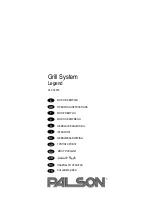
Proper care and maintenance will keep your grill in top operating
condition and prolong its life. Follow these cleaning procedures on
a timely basis and your grill will stay clean and operate with
minimum effort.
CAUTION:
Be sure your grill is OFF and cool before cleaning.
Cleaning Exterior Stainless Steel Surfaces:
Routine care and maintenance is required to preserve
the appearance and corrosion resistance of stainless
steel. The fact is stainless steel can corrode, rust and
discolor under certain conditions. Rust is caused when
regular steel particles in the atmosphere become at-
tached to the stainless steel surface. Steel particles can
also become attached to your grill if you use steel wool
or stiff wire brushes to clean the grill instead of non-
abrasive cloth, sponge or nylon cleaning tools. In coastal
areas rust pits can develop on stainless surfaces that
cannot be fully removed. Bleach and other chlorine based
solutions used for household and pool cleaning can
also cause corrosion to stainless steel. Weathering,
extreme heat, smoke from cooking and machine oils
used in the manufacturing process of stainless steel
can cause stainless steel to turn tan in color. Although
there are many factors which can affect the surface ap-
pearance of stainless steel, they do not affect the integ-
rity of the steel or the performance of the grill.
To help maintain the finish of stainless steel follow these
cleaning procedures for the best results:
After every use (after your grill has cooled down), wipe
stainless surfaces with a soft, soapy cloth or sponge
then rinse with water. Be sure to remove all food par-
ticles, sauces or marinades from stainless steel because
these can be highly acidic and damaging to stainless
surfaces.
Never use abrasive cleaners, scrubbers or stiff wire
brushes of any type on your grill.
Use a heat resistant Stainless Steel Cleaner and rub or
wipe in the direction of the stainless steel grain or polish
lines. Do not polish against the grain
.
1.
3.
2.
WARNING
!
!
Failure to comply with these instructions could
result in a fire or explosion that could cause
serious bodily injury, death or property damage.
Keep grill area clear and free from combustible
materials, gasoline and other flammable vapors and
liquids.
Do not obstruct the flow of air for combustion and
ventilation.
Keep the ventilation openings of the tank enclosure
cabinet free and clear of debris.
Visually check burner flames occasionally to ensure
proper flame pattern as shown below.
•
•
•
•
MAGNIFIED VIEW
OF GRILL MAIN BURNER, INFRARED
BURNER AND ROTISSERIE BURNER FLAME THROUGH
OPEN LID.
35
CLEANING AND MAINTENANCE
Before initial use, and periodically thereafter, wash your
Cooking Grids in a mild soap and warm water solution.
You can use a wash cloth or vegetable brush to clean your
Cooking Grids.
You should periodically wash the Flame Tamers in a
soap and warm water solution. Use a vegetable brush to
remove stubborn burnt-on cooking residue. Dry the Flame
Tamers thoroughly before you reinstall them into the
cooking bowl.
To reduce the chance of fire, the Grease Tray should be
visually inspected before each grill use. Remove any
grease and wash Grease Tray with a mild soap and warm
water solution.
Grease can build up on the inside of the Grill lid over time.
This grease can drip onto your deck or patio when the lid
is opened. Visually inspect the inside of the Grill Lid
before each grill use. Remove any grease and wash with
a mild soap and warm water solution.
Cleaning the Cooking Grids
Cleaning the Flame Tamers
Cleaning the Grease Tray
Cleaning the Inside of the Grill Lid
10.
11.
1.
4.
5.
6.
7.
8.
9.
Burning-off excess food after every cookout will keep it
ready for instant use. However, at least every 3 months
you must give the entire grill a thorough cleaning to
minimize your risk of grease fire and keep the grill in top
shape. Follow these steps:
Turn all Control Knobs to the full OFF position.
Turn the LP gas tank valve to the full OFF position.
Disconnect the regulator from the gas tank. Inspect the
hose with regulator assembly for cracking, cuts or any
other damage, and replace as neccessary. Refer to the
Parts List in this Use and Care Guide.
Remove and clean the Flame Tamers, Cooking Grids,
Cooking Rack and Grill Burners.
Cover each Gas Valve Orifice with aluminum foil.
Brush the inside and bottom of the grill with a fiber pad or
nylon brush and wash with a mild soap and warm water
solution. Rinse thoroughly and let dry.
Remove aluminum foil from Orifices and check each
Orifice for obstruction.
Check each Spark Electrode, adjusting as needed. The
space between the Spark Electrode Tip and Spark Re-
ceiver should be approximately 3/16".
Replace the Burners and adjust the Gas Collector Box.
The edge of the collector box should be overlapping the
Burner Port.
Replace Flame Tamers and Cooking Grids.
Reconnect the gas source and observe the Burner flame
for correct operation.
Routine Cleaning of The Grill Interior
3.
2.
WARNING
!
!
Do not leave the grill unattended during burn off. Empty
and clean the grease tray before doing burn-off.










































